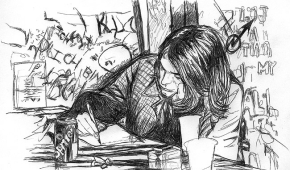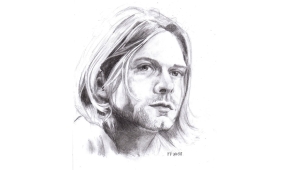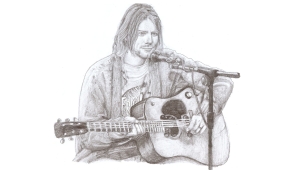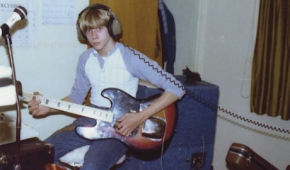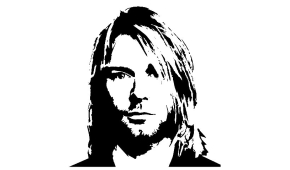Kurt Cobain: Lost Interview Part II
Punk expressed the way I felt socially and politically. There were so many things going on at once. It expressed the anger that I felt the alienation. I
GW: So it was Coburn?
COBAIN: Actually it was Cobain, but the Coburns screwed it up when they came
over. They came from County Cork, which is a really weird coincidence, because
when we toured Ireland, we played in Cork and the entire day I walked around in
a daze. I'd never felt more spiritual in my life. It was the weirdest feeling
and I have a friend who was with me who could testify to this I was almost in
tears the whole day. Since that tour, which was about two years ago, I've had a
sense that I was from Ireland.
GW: Tell me about your high school experience. Were people unpleasant to you?
COBAIN: I was a scapegoat, but not in the sense that people picked on me all the
time. They didn't pick on me or beat me up because I was already so withdrawn by
that time. I was so antisocial that I was almost insane. I felt so different and
so crazy that people just left me alone. I wouldn't have been surprised if they
had voted me Most Likely To Kill Everyone At A High School Dance.
GW: Can you now understand how some people become so alienated that they become
violent?
COBAIN: Yeah, I can definitely see how a person's mental state could deteriorate
to the point where they would do that. I've gotten to the point where I've
fantasized about it, but I'm sure I would opt to kill myself first. But still,
I've always loved revenge movies about high school dances, stuff like Carrie.
GW: When did you first hear punk rock?
COBAIN: Probably `84. I keep trying to get this story right chronologically, and
I just can't. My first exposure to punk rock came when Creem started covering
the Sex Pistols' U.S. tour. I would read about them and just fantasize about how
amazing it would be to hear their music and to be a part of it. But I was like
11 years old, and I couldn't possibly have followed them on the tour. The
thought of just going to Seattle which was only 200 miles away was impossible.
My parents took me to Seattle probably three times in my life, from what I can
remember, and those were on family trips.
After that, I was always trying to find punk rock, but of course they didn't
have it in our record shop in Aberdeen. The first punk rock I was able to buy
was probably Devo and Oingo Boingo and stuff like that; that stuff finally
leaked into Aberdeen many years after the fact.
Then, finally, in 1984 a friend of mine named Buzz Osborne [Melvins
singer/guitarist] made me a couple of compilation tapes with Black Flag and
Flipper, everything, all the most popular punk rock bands, and I was completely
blown away. I'd finally found my calling. That very same day, I cut my hair
short. I would lip sync to those tapes I played them every day and it was the
greatest thing. I'd already been playing guitar by then for a couple of years,
and I was trying to play my own style of punk rock, or what I imagined that it
was. I knew it was fast and had a lot of distortion.
Punk expressed the way I felt socially and politically. There were so many
things going on at once. It expressed the anger that I felt the alienation. It
also helped open my eyes to what I didn't like about metal bands like Aerosmith
and Led Zeppelin. While I really did enjoy, and still do enjoy, some of the
melodies those bands have written, I suddenly realized I didn't like their
sexist attitudes the way that they just wrote about their dicks and having sex.
That stuff bored me.
GW: When did you start to think about sexism? Was it an outgrowth of your
interest in punk?
COBAIN: No, it was before that. I could never find any good male friends, so I
ended up hanging out with the girls a lot, and I just felt that they weren't
being treated equally and they weren't treated with respect. I hated the way
Aberdeen treated women in general they were just totally oppressed. The words
"bitch" and "cunt" were totally common, you'd hear them all the time. But it
took me many years after the fact to realize those were the things that were
bothering me. I was just starting to understand what was pissing me off so much,
and in the last couple of years of high school, I found punk rock and it all
came together. I finally understood that I wasn't retarded, you know?
GW: Did you ever have problems with people thinking you were gay?
COBAIN: Yeah. Even I thought that I was gay. Although I never experimented with
it, I thought that might be the solution to my problem. I had a gay friend, and
that was the only time that I ever experienced real confrontation from people.
Like I said, for so many years they were basically afraid of me, but when I
started hanging out with this guy, Myer Loftin, who was known to be gay, they
started giving me a lot of shit, trying to beat me up and stuff. Then my mother
wouldn't allow me to be friends with him anymore because she's homophobic.
GW: So did you stop?
COBAIN: Yeah. It was real devastating because finally I'd found a male friend
who I could actually talk to and be affectionate with, and I was told I couldn't
hang out with him anymore. Around that same time, I was putting all the pieces
of the puzzle together. He played a big role in that.
Page 1 | Page 2
Comments
Controversy: Advocate
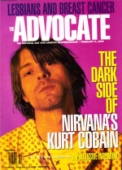 It's 4 o'clock on a cold Seattle afternoon, and Kurt Cobain, the
lyricist-guitarist-lead singer of Nirvana, is sitting in a downtown hotel
room, playing with his 5-month-old daughter, Frances, while his wife,
Courtney Love-lead singer of her own band, Hole-applies her makeup. At the
moment, the Cobains (including the baby) are on the cover of Spin
magazine-which has named Nirvana as Artist of the Year-and the band's new
album, Incesticide, is due out within the week. The Nirvana media machine
should be in high gear.
It's 4 o'clock on a cold Seattle afternoon, and Kurt Cobain, the
lyricist-guitarist-lead singer of Nirvana, is sitting in a downtown hotel
room, playing with his 5-month-old daughter, Frances, while his wife,
Courtney Love-lead singer of her own band, Hole-applies her makeup. At the
moment, the Cobains (including the baby) are on the cover of Spin
magazine-which has named Nirvana as Artist of the Year-and the band's new
album, Incesticide, is due out within the week. The Nirvana media machine
should be in high gear.
Murder or Suicide?
 Kurt's grandfather Leland Cobain, 80, is plagued by the suspicion
that Kurt didn't kill himself. "I think he was murdered," he says. (In
fact, conspiracy theories have spread over the years, but the Seattle
police say the case is closed.)
Kurt's grandfather Leland Cobain, 80, is plagued by the suspicion
that Kurt didn't kill himself. "I think he was murdered," he says. (In
fact, conspiracy theories have spread over the years, but the Seattle
police say the case is closed.)
"It was pretty sad,"
Leland Cobain
says. "I didn't believe it. I couldn't
believe it was suicide. Still don't."
